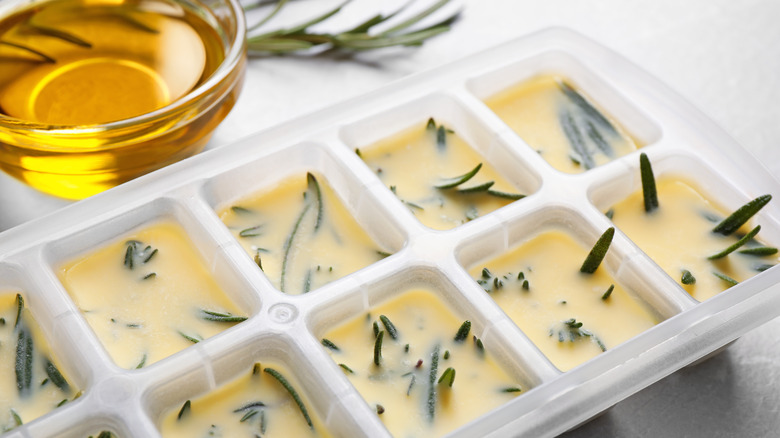Is It Ever Okay To Freeze Olive Oil?
Olive oil is a finicky household staple; it's recommended to be stored in a tightly sealed container, in a dark place, like a pantry or cupboard, and in temperatures anywhere from 55 to 70 degrees Fahrenheit. It's essential to properly store oil, as it can easily oxidize to rancidity and become unsafe to consume. So why, you might ask, would anyone want to freeze their olive oil? And, is it safe?
While it may not be the most common use, freezing olive oil is completely safe and can be done for any number of reasons, such as pre-prepping meals, preserving herbs, and pure convenience. To safely freeze olive oil, you must use an airtight container. Oxidization, which, simply put, is a chemical reaction due to exposure to oxygen, causes foods to go bad quite quickly, so ensuring a fitted lid is crucial. Even if you follow this rule, you may notice cloudiness, separation, or crystals in your frozen olive oil. But don't panic — the oil has many different chemical components (namely triglycerides and fatty acids) with various freezing points; these differences in chemical makeup result in layering and other scary-looking spots, spots that are usually harmless.
Overall, a cool, dark environment is best for olive oil. Stored this way, it can last anywhere from 12-18 months. Frozen olive oil can supposedly last longer, but most sources, quite vaguely, claim that freezing will "extend its shelf life." Regardless, it's always a good idea to smell for spoilage (bad oil smells waxy).
Methods and uses for freezing olive oil
There are two main ways to freeze olive oil: in pre-measured portions or large quantities. The first method is to freeze the oil as a pre-measured, fresh-herb infused ice cube. To do this, use a silicone ice cube tray (for easy removal), measure out however much oil you want per cube (for reference, a standard ice cube is about 2 tablespoons), and add chopped herbs, such as chives, rosemary, thyme, parsley, basil, or sage. Store any olive oil ice cubes either in an ice cube tray with a fitted lid or in a freeze-safe bag with limited air for up to six months. When you're ready to cook, simply pop out however much you need and place it directly into your pan to melt. Try infused ice cubes in these rosemary and thyme-heavy potatoes or this lemon basil chicken.
The second method is to freeze a significant amount of olive oil in one container. If choosing this method, remember to use an airtight container, preferably made of freeze-safe glass. This storage option would really only be recommended to preserve a surplus of olive oil, as it has disadvantages in the thawing process. When frozen in large quantities, the oil needs to be thawed slowly, in room temperature air or water, and it requires thawing all of it at one time. Since you're not likely to use an entire bottle of olive oil at one time, this will lead to refreezing, which, while not a threat to safety, could become a threat to quality over time.

